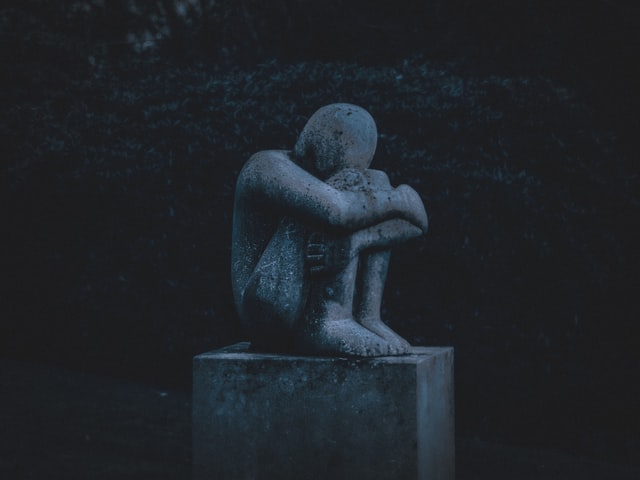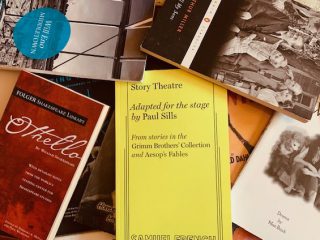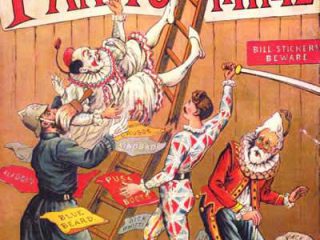*Note: This article discusses mental illness, trauma, violence, and suicide.
In the fall of 2021, I directed the musical Jekyll & Hyde by Frank Wildhorn and Leslie Bricusse. This was actually my second time directing it; however, something fundamental happened that shifted my worldview and perspective on the show in the seven-year gap. After a nine-year battle with Parkinson’s Disease, my father passed away in January 2021.
As I began my dramaturgical work for Jekyll & Hyde, my grief made me think: If given the opportunity, wouldn’t I have done anything to ease my dad’s suffering? Now I started to see Henry Jekyll not just as a well-intentioned but misguided scientist. Instead, I saw his desperation and heartbreak, his love and dedication to his father, all the things that made him declare “I Need to Know.” Working through the rehearsal process, trusting my actors to follow my vision, and honestly engaging with the material–this experience proved to be cathartic and helped me understand my process of grief and mourning even more. Theatre is in a unique position to encourage emotional health, including for those who have experienced trauma.

Theatre About Grief and Trauma
Psychodrama is one part of the larger concept of art therapy–using arts to process through emotional trauma and establish stronger mental health. Beyond this direct use and treatment, we often hear about the arts being therapeutic. In theatre, people find community and emotional safety through storytelling. That safe space allows for healing.
Many years ago while teaching high school, I directed William Mastrosimone’s Bang Bang You’re Dead. Written in 1999, the one-act play was inspired by school shootings, specifically Heath High School (Paducah, KY), Westside School (Jonesboro, AK), and Thurston High School (Springfield, OR). Just a few weeks after its premiere, the Columbine High School shooting happened. The play is challenging in that it is from the perspective of the shooter, a high school student named Josh. He is in his prison cell and forced to face the five people he killed in the high school cafeteria. Through the process of rehearsal, my young actors and I developed a safe space of emotional vulnerability, respecting the weight of the material and how it made each of us feel. Our production was so successful that the principal asked us to present it to the whole school in a special assembly–the experience of theatre was educational and therapeutic.
Like Bang Bang You’re Dead, many plays about trauma are inspired by personal experience and social events, and provide both education and healing for larger social conflicts. Anna Deavere Smith’s verbatim theatre production Twilight: Los Angeles, 1992 chronicles the thoughts, feelings, and experiences of people who lived through the Race Riots in Los Angeles. After the 2020 killing of George Floyd, Smith’s play and her filmed performance were again. The Laramie Project, developed in 2000 by The Tectonic Theatre Project, documents the community reactions to the murder of Matthew Shephard, the victim of an anti-gay hate crime. The play is popular among young audiences and LGBTQ activists for both education and community healing.

The 2017 play 26 Pebbles chronicles the aftermath of the 2012 Sandy Hook school shooting. Through direct addresses to the audience, the parents and community members of Sandy Hook and Newtown share their memories of the December 14 attack and how they survived the shock and grief of the event. The musical Come From Away is the story of September 12, 2001–as the world processed the terror attacks and destruction of the day before. Breathe: Portraits from a Pandemic presents a series of vignettes about life during the early days of the COVID-19 pandemic, the anxiety and fear about the virus, the frustration of lockdowns, and the grief of losing loved ones.
We also see shows written as personal chronicles of an individual person’s experience, especially as they process trauma and seek out healing. The 2013 musical Fun Home is based on Alison Bechdel’s graphic novel: She discovers her own sexuality and identity at the same time her father is struggling against his secret life as a gay man–culminating in her father’s suicide. Sarah Kane’s last play before her 1999 death 4.48 Psychosis reveals her honest experience with profound depression. Some critics interpret the play as her suicide note; others focus on the ability of the play to accurately describe depression and how it affects the mind, body, and relationships.
Peace Through the Practice of Theatre
But as my own experience taught me, it’s not just the theatre about traumatic events that can be helpful (even necessary for some) to process mourning and the significant life shifts that happen in trauma. The show itself doesn’t need to be centered on a traumatic experience. In Jekyll & Hyde, the image of Jekyll’s father disappears by the end of Act One, and Jekyll is instead consumed by his fight against Hyde. But the initial driving conflict propelled my understanding and even compassion for such a flawed character. My actor and I discussed Jekyll’s character arc in terms of his dedication to his father, up until the final line of the show, which echoes the last line he spoke in the hospital: “Good night, Father.” For me, still dealing with my own personal grief, this moment was a catharsis. If only for a short while, I could alleviate my mourning.
So how do we as theatre artists create a space in which we can work through trauma as a collective group? The first step is through true honesty about what we are feeling, and recognizing that each person in the ensemble will open up in their own time. As leaders of the group, we can not only appropriately share how the material may be emotionally difficult, but we must also listen to the actors and respect their struggles. During Spring Awakening, one of my actors admitted to me that she was not going to be able to sing “Left Behind,” the piece at Moritz’s funeral. Her mother had died by suicide only a year before, and each time we rehearsed, she broke down in tears. But by playing through the scene, having that vulnerable experience, and then allowing the other cast members to comfort her, this young woman was able to have healing. As the director, I let her set the terms of her experience in this moment.
We must also recognize that grief and trauma manifest differently for everyone. For example, a car accident. One person may be able to shake it off and start driving again immediately. Another person may experience anxiety and panic by just being a passenger. Both reactions are valid, and should be respected. The same is true when working through theatre material. We bring our own personal experiences to the rehearsal and production, and honoring our own vulnerability as well as that of our fellow artists allows the necessary emotional security and safety. There is no judgment or criticism, but validation of what we feel in the moment. The theatre space is one of respect, always.
I wish there was a simple formula for understanding trauma and grief. I’m sure most people do, too. But I do think that as theatre artists, we are in a unique position to have more empathy for others, and to use that empathy as a foundation of emotional security and support. I consider myself very lucky to have had opportunities to be vulnerable and take risks in my work, to provide a safe space for others and promote healing.
If you or someone you know is struggling with mental health, grief, or trauma, the websites below provide extensive resources and contact information to help you on your journey.














